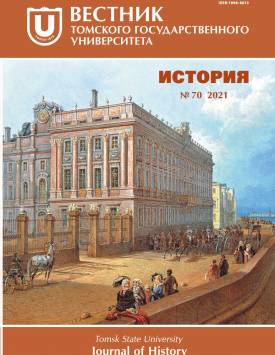The struggle against bolshevism as a factor of the intervention policy-making after the armistice of Compiegne (based on the documents of the British war cabinet of ministers dated November-December, 1918)
The article is devoted to the process of the formation of a renewed British policy of intervention in Russia after the Armistice of Compiegne. This policy was based on the necessity to take into account threats to the world retained in the postwar period. According to the official British documents, Bolshevism was considered such a threat. The research objective is to find out the significance and validity of the struggle against Bolshevism as a factor of strengthening of the British intervention in Russia in November-December, 1918. The paper is based on the official documents: the memorandum “Our Present and Future Military Policy in Russia” by the Chief of the Imperial General Staff H. Wilson (November 13, 1918), the memorandum “Future Military Policy in Russia” by the Chairman of the Board of Education H. Fischer (December 5, 1918), the document “Notes on our Policy in Russia”, prepared by the Secretary of State for Foreign Affairs A. Balfour (November 1918), the decision of the conference in the Foreign Office of November 13, 1918 and minutes of the War Cabinet of Ministers meetings of November 14 and December 10, 1918. In November-December, 1918 Bolshevism was viewed at the official level in connection with the development of an updated policy of intervention after the Armistice. It was included as a separate item on the agenda of the Cabinet of Ministers meeting on November 14, 1918 and the decision on a new wave of the intervention was taken in considering the issue of Bolshevism. Bolshevism and several Bolshevism in the renewed policy of intervention though the goal of establishing a certain form of government in Russia was not set. Explanations on this issue were given at the Cabinet meeting on December 10, 1918 while considering Fisher’s memorandum and Balfour’s document. The author concludes that in November-December, 1918 the fight against Bolshevism was an important factor of the British intervention policy due to the following main reasons: Bolshevism was viewed by the Cabinet of Ministers as a danger to the world because of its possible territorial expansion, and the fight against it was viewed as a means to prevent the influence of Germany in the territory of the former Russian Empire and accordingly to strengthen the role of Great Britain in the postwar world.
Keywords
Bolshevism, intervention, Armistice of Compiegne, War Cabinet of MinistersAuthors
| Name | Organization | |
| Mironyuk Sergei A. | Peoples' Friendship University of Russia (RUDN University) | privetsergey95@mail.ru |
References

The struggle against bolshevism as a factor of the intervention policy-making after the armistice of Compiegne (based on the documents of the British war cabinet of ministers dated November-December, 1918) | Tomsk State University Journal of History. 2021. № 70. DOI: 10.17223/19988613/70/12
